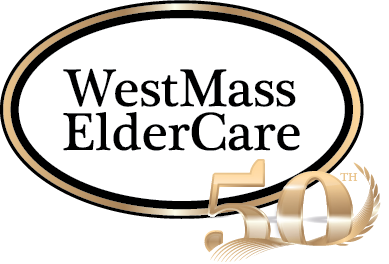 By Maureen Rohan, WMEC Nurse Manager
By Maureen Rohan, WMEC Nurse Manager
When I spoke to Matt on the phone, he didn’t know what to do anymore. He’d been trying his best to take care of his mother, Janet, who suffered from dementia, but it was getting more and more difficult. She would refuse to shower or use the bathroom properly, and when Matt tried to help, she would lash out.
With stress levels rising, Matt called WestMass ElderCare for help.
Together we were able to connect Janet with the care services she needed. But better yet, with key input from Matt, we created a personalized plan that made all the difference. While conducting our assessment, I asked if Janet had a hobby or interest that calmed her. Matt told me that she used to be a master gardener and found great joy whenever she was tending to her plants. Matt recreated this joy for Janet when she needed to complete her hygiene routine, which was stressful for her. By adding a planter and outfitting her with her favorite hat and a pair of gloves, Matt created an environment which helped Janet become much more comfortable with the personal care assistance provided by her caregivers.
At WMEC, we listen, understand, and work with consumers and their caregivers to find a strategy that provides comfort and fits their individual needs. In many cases, we learn just as much from great caregivers like Matt as they learn from us! Care planning is truly a collaborative process that works best when driven by this kind of input from our consumers and caregivers.
Does this story resonate with you? Read on to see just how we can work together to create a personalized plan for your loved ones and get them the support they need.
Programs and Options for All Ages
Before diving into our process, I’d like to dispel the biggest misconception about our care programs: that we only serve older adults. People at every age with disabilities may need extra care, and we can help. For example, WMEC performs Community Nursing Home Screenings for individuals aged 22 and older, and can also assist with Adult Day Health services for those aged 18 and older. For many of our consumers under age 60 who have mental health conditions or developmental disabilities, these supports can make it possible for them to live independently.
Three Steps for Personalized Care
WMEC’s Health Services are consumer-focused and individually tailored to fit every age, condition, and lifestyle. How are we able to provide personalized plans to such the many individuals needing care in our region? We take a patient-first approach that can be summarized in three steps: Assess, Educate, and Advocate.
1. Assess
WMEC’s nursing staff first performs assessments. These are conversations between our nursing staff and the person who needs care, and their family or caregiver. We go into great detail, so that we can fully understand our consumers’ medical history, current needs, as well as their goals, their strengths, their biggest challenges, and more.
The assessment gives us a comprehensive understanding of the consumer and their unique situation. Then we can create an individualized care plan to best fit their needs. Our care recommendations empower the consumer to live as independently and comfortably as possible. This includes using what already works, like Matt’s ingenious gardening strategy with his mother Janet. If the consumer or caregiver has a preferred routine that is successful, we make sure to incorporate it into their care plan.
2. Educate
Second, we educate consumers and caregivers, offering them resources they can use in their daily care and routines. For example, we help consumers and their families complete “fall assessments” to identify trouble areas in the home that may cause stumbling or other accidents. We notice when bathrooms could benefit from additional safety features like grab bars, non-slip mats, or even transfer tub seats. Simple additions like this can create a world of difference in allowing consumers to live more confidently and safely.
Education doesn’t stop with the consumer. We recognize that caregivers have their own challenges and need support as well. By staying sensitive to their emotions and needs, we offer caregivers strategies to manage challenging situations with consumers and combat caregiver fatigue.
3. Advocate
WMEC’s Health Services can help empower and support adults in our community wherever they may be. For example, WMEC nurses conduct nursing home screenings, which ensures that the facility meets the needs and standards of care the consumer is looking for. These crucial services aren’t exclusive to people looking for long-term care. We provide the same level of consideration for people who are looking for short-term solutions or need more immediate support like a respite stay.
Because we are focused on helping consumers achieve their goals for independence, sometimes we advocate for individuals to transition out of long-term care back to their home. If a consumer wants to leave a nursing home or reintegrate into their community, then we work to create a plan of success for them. Whatever the end goal, the process is person-centered and focused on our consumers’ needs and priorities
Ready to find a care plan that works for you and your loved ones? Reach out to us online or give us a call at (413) 538-9020. For more details, ask for someone from Information and Referral who will be able to answer any questions you may have about care, services, nursing homes, and more. They can also direct you to a WMEC team member better suited to get you the specific support and resources you need.


